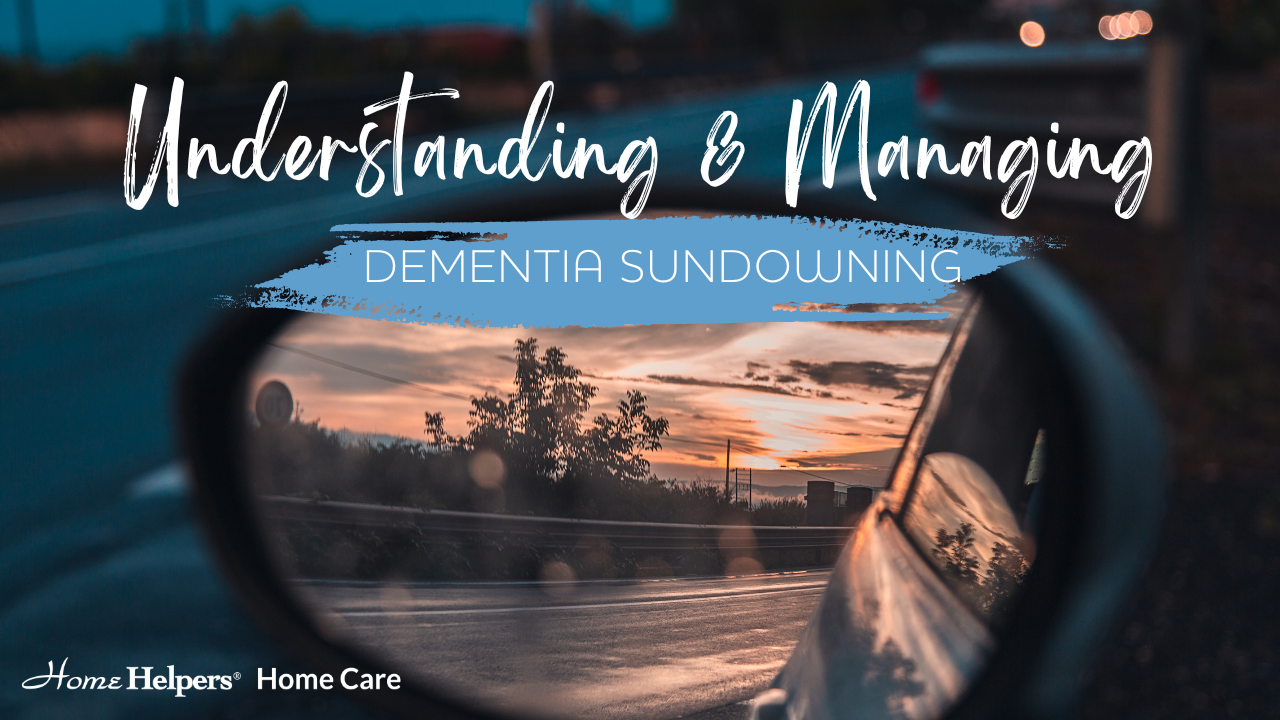Understanding and Managing Sundowning in Dementia Patients in the Northern Shenandoah Valley

Author: Home Helpers Home Care
Sundowning, often referred to as late-day confusion, is a common challenge for families caring for a loved one with dementia. As the sun sets in the Shenandoah Valley—from Winchester to Front Royal to Purcellville—caregivers may notice their loved one becoming more agitated, anxious, or disoriented. This late-day behavioral shift can be overwhelming, but with the right strategies and support, it can be managed.
Understanding sundowning and taking proactive steps to address it can significantly improve comfort and reduce stress for everyone involved.
1. Understanding Sundowning
Sundowning typically occurs in the late afternoon or evening, although its root causes are still being studied. Experts believe it stems from changes in the brain’s circadian rhythm, which regulates the body’s internal clock.
In Northern Shenandoah Valley homes, where daylight shifts across the mountains and rural landscapes, decreasing light levels can increase confusion. Fatigue, overstimulation, or even hunger may contribute, making this time of day particularly sensitive for those with dementia.
2. Recognizing Symptoms of Sundowning
You might notice:
- Increased Confusion – Disorientation about time or place
- Agitation or Pacing – Repetitive movements or expressions of anxiety
- Mood Swings – Irritability, anger, or sadness without clear cause
- Hallucinations – Seeing or hearing things that aren’t present
- Disturbed Sleep – Difficulty falling asleep or restlessness at night
Recognizing these signs is the first step toward providing appropriate care and comfort.
3. Strategies to Manage Sundowning
Establish a Consistent Routine
In Winchester or small towns like Purcellville, a steady rhythm to the day can help dementia patients feel more grounded. Try:
- Keeping mealtimes, bathing, and bedtime consistent
- Introducing quiet, soothing activities before sunset (folding laundry, puzzles, or listening to music)
- Avoiding napping too late in the day
Predictability helps reduce confusion and feelings of loss of control.
Optimize the Environment
Your home environment can dramatically influence behavior during sundowning hours. Consider:
- Turning on lights before sunset to reduce shadows
- Using warm lighting and nightlights in hallways
- Reducing background noise (TVs, loud conversations) in the evening
A tranquil, well-lit setting creates security.
Promote Physical and Mental Activity
Encourage light physical activity early in the day:
- Gentle walks in Jim Barnett Park in Winchester or along Purcellville’s scenic paths
- Sorting items, watering plants, or dancing to familiar music
- Engaging in meaningful tasks that tap into long-term memory
Mental and physical stimulation early in the day promotes better sleep and calmer evenings.
Monitor Diet and Hydration
Help reduce agitation by:
- Offering regular, balanced meals—avoid caffeine or sugar in the afternoon
- Encouraging steady hydration with water or herbal teas
- Limiting heavy evening meals that may disrupt digestion and sleep
What your loved one eats and drinks can influence their evening mood and energy.
Manage Sleep Patterns
A predictable bedtime routine may include:
- A warm bath, herbal tea, or soothing music
- Turning off screens at least an hour before bed
- Maintaining the same wake-up and sleep time each day
If needed, consult a physician about natural sleep aids or behavior-based strategies.
Provide Reassurance and Comfort
In the Northern Shenandoah Valley, families often find comfort in nature, tradition, and connection. These can also help your loved one feel safe:
- Speak softly and maintain eye contact
- Offer a cozy item like a blanket or sweater
- Redirect with calming activities like reading, listening to hymns, or looking at photo albums
Simple acts of presence can ease fear and restore peace.
4. When to Seek Professional Help
If your loved one’s sundowning escalates or becomes dangerous, it may be time to seek guidance from a healthcare provider. In our area, memory clinics and geriatric care providers in Winchester and surrounding communities can help you:
- Rule out medical causes (e.g., infections, medication issues)
- Explore care plans customized to your loved one’s dementia stage
- Access behavioral therapy or medication if needed
Don't wait until you're overwhelmed—professional insight can make a world of difference.
5. How Home Helpers Home Care of Northern Shenandoah Valley Can Support You
At Home Helpers Home Care of Northern Shenandoah Valley, we help families in Winchester, Front Royal, Purcellville, and nearby communities navigate the challenges of sundowning with confidence and compassion.
Our Caregivers are trained in dementia-specific strategies and offer:
- Personal Care – Evening routines that promote comfort and dignity
- Environment Optimization – Creating calm, well-lit home spaces
- Engaging Activities – Gentle redirection through purposeful tasks
- Sleep Support – Establishing and maintaining healthy rest cycles
- Companionship – A trusted presence during vulnerable evening hours
We bring consistency and understanding to each visit, ensuring your loved one feels secure.
Conclusion
Sundowning doesn’t have to take over your evenings. With the right support system and caregiving techniques, it’s possible to ease its intensity and protect your loved one’s well-being. Let your journey through dementia care be guided by empathy, preparation, and expert help when needed.
📞 Call Home Helpers Home Care of Northern Shenandoah Valley at (540) 709-1324 to learn how our dementia care specialists can support your family through every phase of the day.
Sources:
- Alzheimer’s Association. (2023). Sundowning: Late-Day Confusion – www.alz.org
- National Institute on Aging. (2023). Managing Sleep Problems in Alzheimer’s Disease – www.nia.nih.gov
- Mayo Clinic. (2023). Alzheimer's Sundowning: Tips for Coping – www.mayoclinic.org
